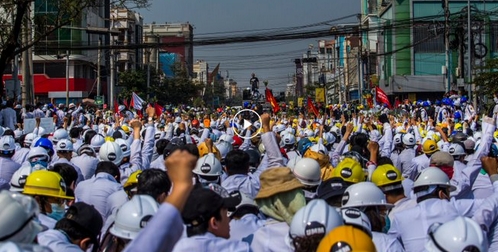
Protesters in Myanmar prepared for more demonstrations against junta rule on Monday, defying a crackdown a day earlier that killed at least 18 people in the bloodiest violence since the military seized power one month ago.
Violence flared in various parts of the country on Sunday and police opened fire on crowds in several areas of the biggest city of Yangon, after tear gas and warning shots failed to clear protesters demanding the restoration of Aung San Suu Kyi’s government.
US Secretary of State Antony Blinken condemned what he called “abhorrent violence” by security forces. Canada’s foreign minister, Marc Garneau, called the military’s use of lethal force against its own people “appalling”.
Myanmar has been in chaos since the army seized power and detained elected government leader Suu Kyi and much of her party leadership on Feb. 1, alleging fraud in a November election her party won in a landslide.
Suu Kyi faces charges of illegally importing six walkie-talkie radios and of violating a natural disaster law by breaching coronavirus protocols. Her latest court hearing is scheduled for Monday.
The coup, which brought a halt to tentative steps towards democracy after nearly 50 years of military rule, has drawn hundreds of thousands of demonstrators onto the streets and the condemnation of Western countries.
Tom Andrews, the United Nations special rapporteur on human rights in Myanmar said it was clear the junta’s assault would continue so the international community needed to ratchet up its response.
He proposed a global arms embargo, more sanctions from more countries on those behind the coup, sanctions on the military’s businesses and a U.N Security Council referral to the International Criminal Court.
“Words of condemnation are welcome but insufficient. We must act,” Andrews said in a statement.
“The nightmare in Myanmar that is unfolding before our eyes will get worse. The world must act.”
Small memorials were held for the victims, with people lighting candles in front of their houses on Sunday.
About 10 police and military vehicles were deployed on Monday at a Yangon intersection where protesters had clashed with security forces a day earlier, a witness told Reuters.
Some protesters called for the destruction of surveillance cameras used by authorities, while others shared pepper spray recipes on social media for use if demonstrators are attacked by plain-clothes security personnel.
Others made metal shields for those on the front lines, who took on police and soldiers in full battle gear. Some of the security forces belonged to units notorious for tough crackdowns on ethnic rebel groups.

“I declare Myanmar military as a terrorist organisation,” Thinzar Shunlei Yi, a prominent youth activist posted on her Facebook page in response to the killings.
A committee representing lawmakers who won seats in the November election said at least 26 people were killed in the violence on Sunday, which Reuters was unable to verify.
“The excessive use of force and other violations committed by the military junta are being recorded and they will be held accountable,” it said on Twitter.
The military has not commented on Sunday’s violence and police and military spokesmen did not answer calls.
In a post dated Feb. 28, the state-run Global New Light of Myanmar newspaper warned “severe action will be inevitably taken” against “anarchic mobs” that the military could not ignore, despite having previously showed restraint.
The Assistance Association for Political Prisoners said at least 270 people were detained on Sunday, from a total 1,132 it said had been arrested, charged or sentenced since the coup.
Some witnesses said they saw people beaten by police before being taken away.
U.S. Secretary of State Blinken on Sunday said the United States stood firmly with the people of Myanmar.
“(We) encourage all countries to speak with one voice in support of their will,” he said on Twitter.
Defiance of the coup has emerged not just on the streets but more broadly in the civil service, municipal administration, the judiciary, the education and health sectors and the media.
Activists across Asia held protests in support, with the rallying cry “Milk Tea Alliance” which first united pro-democracy activists in Thailand and Hong Kong.
While some Western countries have imposed limited sanctions, the generals have traditionally shrugged off diplomatic pressure. They have promised to hold a new election but not set a date.
(Source: Reuters)

